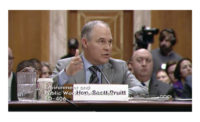The controversial Waters of the United States rule (WOTUS) won’t be implemented until 2020 under a decision finalized Jan. 31 by the Environmental Protection Agency and the Army Corps of Engineers. By that time, the federal government hopes to have in place a less-expansive replacement to the regulation issued in 2015 under President Obama.
“Today, EPA is taking action to reduce confusion and provide certainty to America’s farmers and ranchers,” EPA Administrator Scott Pruitt said in a statement. “The 2015 WOTUS rule developed by the Obama administration will not be applicable for the next two years while we work through the process of providing long-term regulatory certainty across all 50 states about what waters are subject to federal regulation.”
Pruitt has said a rule to replace WOTUS will be finished by the end of this year. WOTUS was a joint regulation issued by the EPA and the Corps that sought to clarify which wetlands and streams are subject to federal regulatory jurisdiction. That definition has been unclear following past Supreme Court rulings.
Opponents of the regulation, including construction interests and farmers, contend it was an example of federal overreach. But the rule's supporters, including environmental groups, said it provided needed protection for ecologically valuable bodies of water.
The Jan. 31 action eliminates the immediate possibility that the regulation could be implemented in some states but not others following a Jan. 22 U.S. Supreme Court decision that would have effectively lifted a nationwide stay on implementing it.
“We are committed to transparency as we execute the Clean Water Act Section 404 regulatory program,” said Ryan Fisher, acting assistant secretary of the Army for civil works, said in a statement. “The Army and EPA proposed this rule to provide the regulated public clarity and predictability during the rulemaking process.”
The Natural Resources Defense Council said it will challenge the decision to delay implementation of WOTUS in court. “It’s grossly irresponsible, and illegal, Jon Devine, senior attorney for NRDC, said in a statement.





Post a comment to this article
Report Abusive Comment